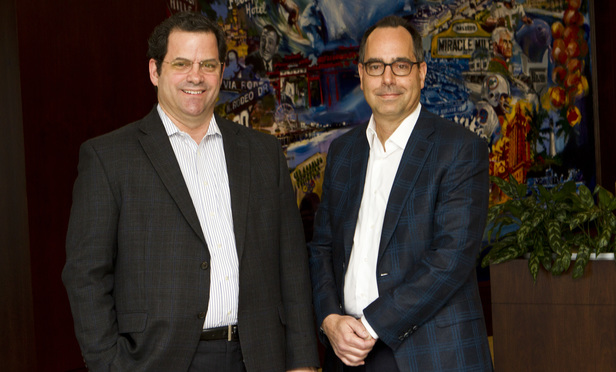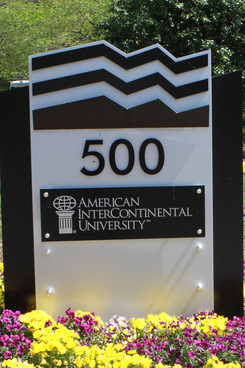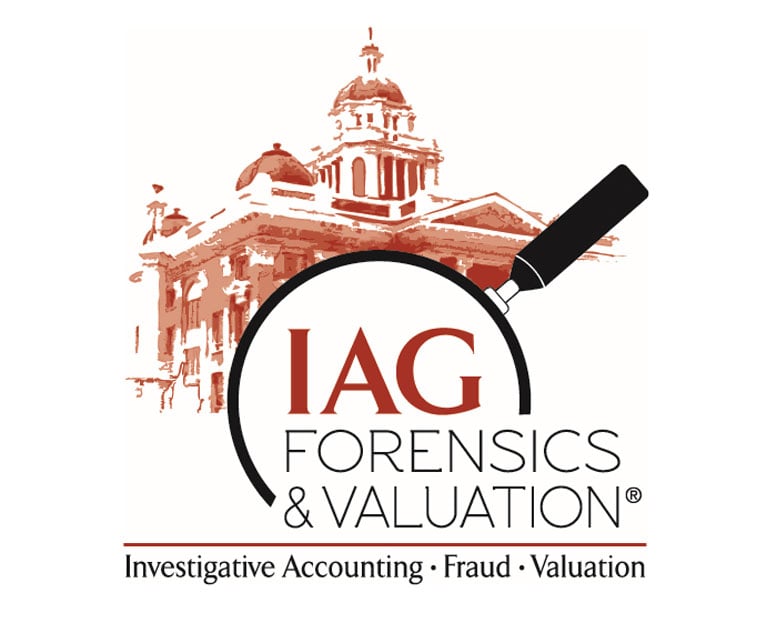For-Profit University Pays $32M to Settle Whistleblower Suit
When Atlanta attorney Joseph Wargo and partner David Pernini first filed a federal whistleblower case against a private, for-profit university with campuses in Atlanta's northern suburbs, they had no idea the litigation would last more than eight years.
April 12, 2017 at 09:18 AM
5 minute read
 L-R David Pernini and Joe Wargo, Wargo French, Atlanta. (John Disney/ ALM)
L-R David Pernini and Joe Wargo, Wargo French, Atlanta. (John Disney/ ALM)
When Atlanta attorney Joseph Wargo and partner David Pernini first filed a federal whistleblower case against a private, for-profit university with campuses in Atlanta's northern suburbs, they had no idea the litigation would last more than eight years.
But Wargo said this week that the partners' belief in the case against American InterContinental University and parent company Career Education Corp. prompted them to hold the course on behalf of four whistleblowers from the university's Dunwoody campus, even after federal prosecutors declined to intervene on the whistleblowers' behalf and U.S. District Judge Richard Story tossed out the case in 2011.
Their persistence finally paid off. In March, after a successful appeal to the U.S. Court of Appeals for the Eleventh Circuit that led to a new ruling by Story—this time in the whistleblowers' favor—the university and its parent company quietly settled the long-running federal case for $32 million.
 American InterContinental University, Atlanta Campus. (John Disney/ALM)
American InterContinental University, Atlanta Campus. (John Disney/ALM)That settlement was consummated just weeks after U.S. News and World Report listed American InterContinental among the top 10 percent of online universities in its annual compendium of colleges and universities. The settlement amount appeared nowhere in the federal court file. But Career Education Corp. did notify its shareholders in a subsequent filing with the U.S. Securities and Exchange Commission that it had agreed to pay the federal government $10 million to settle claims that for years it had defrauded the U.S. Education Department of millions of dollars in student aid funds. It also agreed to pay the lawyers $22 million.
“These were people who really believed in the case and wanted to pursue it,” Wargo said of his clients. “A lot of these cases fail for lack of attention or persistence either by counsel or the relators [whistleblowers]. “It took eight-and-a-half years, a trip up to the Eleventh Circuit and to the U.S. Supreme Court and back to get the positive outcome for the whistleblowers. … But we kept at it. We had clients who believed in the case. We believed in the case.”
In settling, Career Education Corp. admitted no violations of the law and, according to the SEC filing, continues to maintain that it “acted at all times in compliance” with all applicable laws and regulations.
Neither the university, lead defense counsel John Latham of Atlanta's Alston & Bird, nor two attorneys with Chicago firm Katten Muchin Rosenman who were also members of the defense team responded to calls for comment. But the SEC filing said the company simply wanted to avoid the expense of further litigation. “By eliminating the distraction caused by this lawsuit, the company's management can provide more attention to the company's core operations and its goal of enhancing retention and outcomes for its students.”
Wargo said the four whistleblowers—a former academic adviser, a former employee in the university registrar's office, the former vice president of academic affairs and onetime acting president of the Dunwoody campus, and the former director of that campus' Department of Human Resources—will receive nearly 30 percent of the $10 million recovered for the federal government. The federal False Claims Act permits individuals to sue on behalf of the federal government whenever they contend and can prove that the government is being defrauded. If the suit is successful, whistleblowers are allowed to claim as much as 30 percent of any funds that are recovered for the government.
Wargo said the $22 million in legal fees stemmed from “an incredibly hard fought case” that pitted his boutique firm against larger teams of big law attorneys from Alston & Bird, Katten Muhin Rosenman and, until 2013, Taylor English Duma.
Wargo said that, over the course of the litigation, he and his partner took more than 50 depositions across the country in a case that eventually included nearly 500 docket entries as well as the federal appeal. “It was very complex and very expensive,” he said.
Wargo said the Eleventh Circuit's 2015 decision to reverse Story and remand the case “entirely changed the ball game.” The appellate ruling, based on an intervening U.S. Supreme Court case, “made clear that our clients continued to have a cause of action where Judge Story had previously held … they did not,” he said. Story's decision last fall to reverse his previous ruling and deny American InterContinental's motion for summary judgment set the stage for a trial that Wargo said likely prompted the settlement.
American InterContinenal University's aggressive tactics in soliciting and retaining students were at the heart of the whistleblower case, which stemmed from complaints by the Dunwoody campus staff that the university had lied to the U.S. Department of Education in order to secure millions of dollars in federal student aid and had violated a federal ban on using financial incentives or quotas to boost student recruitment.
Contact R. Robin McDonald at [email protected]. On Twitter: @rrobinmcdonald
NOT FOR REPRINT
© 2025 ALM Global, LLC, All Rights Reserved. Request academic re-use from www.copyright.com. All other uses, submit a request to [email protected]. For more information visit Asset & Logo Licensing.
You Might Like
View All
IAG Forensics & Valuation is excited to announce promotions at our firm effective 1/1/2025.
1 minute read
Climate Disputes, International Arbitration, and State Court Limitations for Global Issues
Trending Stories
Who Got The Work
J. Brugh Lower of Gibbons has entered an appearance for industrial equipment supplier Devco Corporation in a pending trademark infringement lawsuit. The suit, accusing the defendant of selling knock-off Graco products, was filed Dec. 18 in New Jersey District Court by Rivkin Radler on behalf of Graco Inc. and Graco Minnesota. The case, assigned to U.S. District Judge Zahid N. Quraishi, is 3:24-cv-11294, Graco Inc. et al v. Devco Corporation.
Who Got The Work
Rebecca Maller-Stein and Kent A. Yalowitz of Arnold & Porter Kaye Scholer have entered their appearances for Hanaco Venture Capital and its executives, Lior Prosor and David Frankel, in a pending securities lawsuit. The action, filed on Dec. 24 in New York Southern District Court by Zell, Aron & Co. on behalf of Goldeneye Advisors, accuses the defendants of negligently and fraudulently managing the plaintiff's $1 million investment. The case, assigned to U.S. District Judge Vernon S. Broderick, is 1:24-cv-09918, Goldeneye Advisors, LLC v. Hanaco Venture Capital, Ltd. et al.
Who Got The Work
Attorneys from A&O Shearman has stepped in as defense counsel for Toronto-Dominion Bank and other defendants in a pending securities class action. The suit, filed Dec. 11 in New York Southern District Court by Bleichmar Fonti & Auld, accuses the defendants of concealing the bank's 'pervasive' deficiencies in regards to its compliance with the Bank Secrecy Act and the quality of its anti-money laundering controls. The case, assigned to U.S. District Judge Arun Subramanian, is 1:24-cv-09445, Gonzalez v. The Toronto-Dominion Bank et al.
Who Got The Work
Crown Castle International, a Pennsylvania company providing shared communications infrastructure, has turned to Luke D. Wolf of Gordon Rees Scully Mansukhani to fend off a pending breach-of-contract lawsuit. The court action, filed Nov. 25 in Michigan Eastern District Court by Hooper Hathaway PC on behalf of The Town Residences LLC, accuses Crown Castle of failing to transfer approximately $30,000 in utility payments from T-Mobile in breach of a roof-top lease and assignment agreement. The case, assigned to U.S. District Judge Susan K. Declercq, is 2:24-cv-13131, The Town Residences LLC v. T-Mobile US, Inc. et al.
Who Got The Work
Wilfred P. Coronato and Daniel M. Schwartz of McCarter & English have stepped in as defense counsel to Electrolux Home Products Inc. in a pending product liability lawsuit. The court action, filed Nov. 26 in New York Eastern District Court by Poulos Lopiccolo PC and Nagel Rice LLP on behalf of David Stern, alleges that the defendant's refrigerators’ drawers and shelving repeatedly break and fall apart within months after purchase. The case, assigned to U.S. District Judge Joan M. Azrack, is 2:24-cv-08204, Stern v. Electrolux Home Products, Inc.
Featured Firms
Law Offices of Gary Martin Hays & Associates, P.C.
(470) 294-1674
Law Offices of Mark E. Salomone
(857) 444-6468
Smith & Hassler
(713) 739-1250








